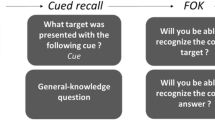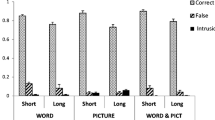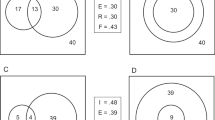Abstract
A group of adults with Asperger syndrome and an IQ-matched control group were compared in remember versus know recognition memory. Word frequency was also manipulated. Both groups showed superior recognition for low-frequency compared with high-frequency words, and in both groups this word frequency effect occurred in remembering, not in knowing. Nor did overall recognition differ between the two groups. However, recognition in the Asperger group was associated with less remembering, and more knowing, than in the control group. Since remembering reflects autonoetic consciousness, which is the hallmark of an episodic memory system, these results show that episodic memory is moderately impaired in individuals with Asperger syndrome even when overall recognition performance is not.
Similar content being viewed by others
REFERENCES
Asperger, H. (1944). Die “autistische Psychopathen” im Kindesalter. Archiv für Psychiatrie und Nervenkrankheiten, 117, 76–136.
Asperger, H. (1991). Autistic psychopathy in childhood (V. Frith, Trans.). In U. Frith (Ed.), Autism and Asperger syndrome. Cambridge, UK: CUP. (Original work published 1944).
Baron-Cohen, S., Leslie, A., & Frith, U. (1985). Does the autistic child have a theory of mind'? Cognition, 21, 37–46.
Barth, C., Fein, D., & Waterhouse, L. (1995). Delayed match-to-sample performance in autistic children. Developmental Neuropsychology, 11, 53–69.
Benetto, L., Pennington, B. F., & Rogers, S. J. (1996). Intact and impaired memory function in autism. Child Development, 67, 1816–1835.
Bishop, D. (1993). Autism, executive functions and Theory of Mind: A neuropsychological perspective. Journal of Child Psychology and Psychiatry, 34, 279–294.
Blaxton, T. A., & Theodore, W. H. (1997). The role of the temporal lobes in recognizing visuospatial materials: Remembering versus knowing. Brain and Cognition, 35, 5–25.
Boucher, J. (1981). Immediate free recall in early childhood autism: Another point of similarity with the amnesic syndrome. British Journal of Psychology, 72, 211–215.
Boucher, J., & Lewis, V. (1989). Memory impairments and communication in relatively able autistic children. Journal of Child Psychology and Psychiatry, 30, 99–122.
Boucher, J., & Warrington, E. (1976). Memory deficits in early infantile autism: Some similarities to the amnesic syndrome. British Journal of Psychology, 67, 73–87.
Bowler, D. M. (1992) 'Theory of Mind' in Asperger's syndrome. Journal of Child Psychology and Psychiatry, 33, 877–893.
Bowler, D. M. (1997). Reaction times to mental state and non-mental state questions in false belief tasks by high-functioning individuals with autism. European Child and Adolescent Psychiatry, 6, 160–165.
Bowler, D. M., Matthews, N. J., & Gardiner, J. M. (1997). Asperger's syndrome and memory: Similarity to autism but not amnesia. Neuropsychologia, 35, 65–70.
Burack, J. A., Enns, J. T., Stauder, J. E. A., Mottron, L., & Randolph, B. (1997). Attention and autism: Behavioural and electrophysiological evidence. In D. J. Cohen & F. R. Volkmar (Eds.), Handbook of autism and pervasive developmental disorders (pp. 226–247). New York: Wiley.
Coltheart, M. (1981). The MRC psycholinguistic database. Quarterly Journal of Experimental Psychology, 33A, 497–508.
Dalla Barba, G. (1997). Recognition memory and recollective experience in Alzheimer's disease. Memory, 5, 657–672.
Damasio, A. R., & Maurer, R. G. (1978). A neurological model for childhood autism. Archives of Neurology, 35, 777–786.
Farrant, A., Blades, M., & Boucher, J. (1998). Source monitoring by children with autism. Journal of Autism and Developmental Disorders, 28, 43–50.
Gardiner, J. M., & Java, R. I. (1990). Recollective experience in word and nonword recognition. Memory & Cognition, 18, 23–30.
Gardiner, J. M, Kaminska, Z., Dixon, M., & Java, R. I. (1996). Repetition of previously novel melodies sometimes increases both remember and know responses in recognition memory. Psychonomic Bulletin & Review, 3, 366–371.
Gardiner, J. M., & Radomski, E. (1999). Awareness of recognition memory for Polish and English folk songs in Polish and English folk. Memory, 1, 461–470.
Gardiner, J. M., Ramponi, C., & Richardson-Klavehn, A. (1998). Experiences of remembering, knowing, and guessing. Consciousness and Cognition, 7, 1–26.
Gardiner, J. M., & Richardson-Klavehn, A. (2000). Remembering and knowing. In E. Tulving & F. I. M. Craik (Eds.), Handbook of memory. Oxford, UK: Oxford University Press.
Gardiner, J. M., Richardson-Klavehn, A., & Ramponi, C. (1997). On reporting recollective experiences and “direct access to memory systems.” Psychological Science, 8, 391–394.
Gillberg, C., & Gillberg, I. C. (1989). Asperger syndrome-some epidemiological considerations: A research note. Journal of Child Psychology and Psychiatry, 30, 631–638.
Happé, F. G. E. (1995). The role of age and verbal ability in the Theory of Mind task performance of subjects with autism. Child Development, 66, 843–855.
Happé, F., & Frith, U. (1996). The neuropsychology of autism. Brain, 119, 1377–1400.
Hermelin, B., & O'Conor, N. (1967). Remembering of words by psychotic and subnormal children. British Journal of Psychology, 58, 213–218.
Huron, C., Danion, J.-M., Giacomoni, F., Grange, D., Robert, P., & Rizzo, L. (1995). Impairment of recognition memory with, but not without, conscious recollection in schizophrenia. American Journal of Psychiatry, 152, 1737–1742.
Johnson, M. K., Hashtroudi, S., & Lindsey, D. S. (1993). Source monitoring. Psychological Bulletin, 114, 3–28.
Kanner, L. (1943). Autistic disturbances of affective contact. Nervous Child, 2, 217–250.
Kinoshita, S. (1995). The word frequency effect in recognition memory versus repetition priming. Memory & Cognition, 23, 569–580.
Kucera, H., & Francis. W. N. (1967). Computational analysis of present-day american english. Providence, RI: Brown University Press.
Knowlton, B. J., & Squire, L. R. (1995). Remembering and knowing: Two different expressions of declarative memory. Journal of Experimental Psychology: Learning, Memory, and Cognition, 21, 699–710.
Mantyla, T. (1993). Knowing but not remembering: Adult age differences in recollective experience. Memory & Cognition, 21, 379–388.
Mantyla, T. (1997). Recollections of faces: Remembering differences and knowing similarities. Journal of Experimental Psychology: Learning, Memory, and Cognition, 23, 1203–1216.
Minshew, N., Goldstein, G., Muenz, L. R., & Payton, J. (1992). Neuropsychological functioning in nonmentally retarded autistic individuals. Journal of Clinical and Experimental Neuropsychology, 14, 749–761.
Minshew, N., Goldstein, G., Taylor, H., & Siegel, D. (1994). Academic achievement in high-functioning autistic individuals. Journal of Clinical and Experimental Neuropsychology, 16, 261–270.
Nyberg, L., & Tulving, E. (1996). Classifying human long term memory: Evidence from converging dissociations. European Journal of Cognitive Psychology, 8, 163–183.
O'Connor, N., & Hermelin, B. (1967). Auditory and visual memory in autistic and normal children. Journal of Mental Deficiency Research, 11, 126–131.
Parkin, A. J., & Walter, B. (1992). Recollective experience, normal aging, and frontal dysfunction. Psychology and Aging, 7, 290–298.
Pascualvaca, D. M., Fantie, B. D., Papageorgiou, M., & Mirsky, A. F. (1998). Attentional capacities in children with autism: Is there a general deficit in shifting focus? Journal of Autism and Developmental Disorders, 28, 467–478.
Pennington, B., & Ozonoff, S. (1996). Executive functions and developmental psychopathology. Journal of Child Psychology and Psychiatry, 37, 51–87.
Perfect, T. J., & Dasgupta, Z. R. R. (1997). What underlies the deficit in reported recollective experience in old age? Memory & Cognition, 25, 849–858.
Perfect, T. J., Williams, R. B., & Anderton-Brown, C. (1995). Age differences in reported recollective experience are due to encoding effects, not response bias. Memory, 3, 169–186.
Perner, J. (1990). Experiential awareness and children's episodic memory. In W. Schneider & F. E. Weinert (Eds.), Interactions among aptitudes, strategies and knowledge in cognitive performance. New York: Springer.
Perner, J., & Ruffman, T. (1995). Episodic memory and autonoetic consciousness: Developmental evidence and a theory of childhood amnesia. Journal of Experimental Child Psychology, 59, 516–548.
Rajaram, S. (1996) Perceptual effects on remembering: Recollective processes in picture-recognition memory. Journal Of Experimental Psychology: Learning Memory And Cognition, 22, 365–377.
Rumsey, J. M., & Hamburger, S. D. (1988) Neuropsychological findings in high-functioning men with infantile autism, residual state. Journal of Clinical and Experimental Neuropsychology, 10, 201–221.
Schacter, D. L., Verfaillie, M., & Anes, M. D. (1997). Illusory memories in amnesic patients: Conceptual and perceptual false recognition. Neuropsychology, 11, 331–342.
Strack, F., & Forster, J. (1995). Reporting recollective experiences: Direct access to memory systems? Psychological Science, 6, 352–358.
Szatmari, P., Bremner, R., & Nagy, J. (1989). Asperger's syndrome: A review of clinical features. Canadian Journal of Psychiatry, 34, 554–560.
Tager-Flusberg, H. (1991). Semantic processing in the free recall of autistic children. British Journal of Developmental Psychology, 9, 417–430.
Tulving, E. (1983). Elements of episodic memory. New York: Oxford University Press.
Tulving, E. (1985). Memory and consciousness. Canadian Psychologist, 26, 1–12.
Waterhouse, L., Fein, D., & Modahl, C. (1996). Neurofunctional mechanisms in autism. Psychological Review, 103, 457–489.
Wheeler, M. A., Stuss, D. T., & Tulving, E. (1997). Towards a theory of episodic memory: The frontal lobes and autonoetic consciousness. Psychological Bulletin, 121, 331–354.
World Health Organization. (1992). Tenth revision of the international classification of disease. Geneva: Author.
Wimmer, H., & Perner, J. (1983). Beliefs about beliefs: Representation and constraining function of wrong beliefs in young children's understanding of deception. Cognition, 13, 103–128.
Wing, L. (1981). Asperger's syndrome: A clinical account. Psychological Medicine, 11, 115–129.
Author information
Authors and Affiliations
Rights and permissions
About this article
Cite this article
Bowler, D.M., Gardiner, J.M. & Grice, S.J. Episodic Memory and Remembering in Adults with Asperger Syndrome. J Autism Dev Disord 30, 295–304 (2000). https://doi.org/10.1023/A:1005575216176
Issue Date:
DOI: https://doi.org/10.1023/A:1005575216176




